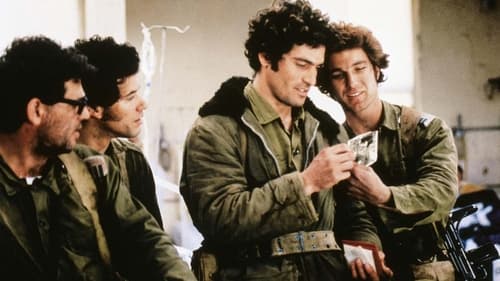
Producer
Gitai pays homage to Albert Camus and explores the return to Palestinian villages while interjecting texts by Izhar Smilansky, Emile Habibi, Mahmoud Darwish, and Amira Hass.

Producer
Mezclando material documental y recreación filmada por Gitai, narra el asesinato de Isaac Rabin, Primer Ministro de Israel, el 4 de noviembre de 1995 en el centro de Tel-Aviv, a manos de un joven fanático sionista.

Producer
Filmed in one sequence-shot of 1 hour and 25 minutes, Ana Arabia is a moment in the life of a small community of outcasts, Jews and Arabs, who live together in a forgotten enclave at the “border” between Jaffa and Bat Yam, in Israel. One day, Yael, a young journalist, visits them. In these dilapidated shacks, in the orchard filled with lemon trees and surrounded by mass public houses, she discovers a range of characters far removed from the usual clichés offered by the region. Yael has the feeling of having discovered a human goldmine. She no longer thinks of her job. Faces and words of Youssef and Miriam, Sarah and Walid, of their neighbors, their friends tell her about life, its dreams and its hopes, its love affairs, desires and disillusions. Their relation to time is different than that of the city around them. In this tinkered and fragile place, there is a possibility of coexistence. A universal metaphor.

Producer
The film intertwines historical events and intimate memories. I observe how architecture represents the transformations of society and those who give form to this architecture. We follow the journey of Munio, my father, born in 1909 in Silesia, Poland, the son of a tenant farmer of a Prussian junker. At the age of 18, Munio goes to Berlin and Dessau to meet Walter Gropius, Kandinsky and Paul Klee at the Bauhaus. In 1933, the Bauhaus was closed by the Nazis, who accused Munio of treason against the German people. Munio was imprisoned, then deported to Basel. He left for Palestine. Upon his arrival in Haifa, he began a career as an architect and adapted European modernist principles to the Middle East.

Producer
A political drama centered around Israel's pullout from the occupied Gaza strip, in which a French woman of Israeli origin comes to the Gaza Strip to find her long ago abandoned daughter.

Executive Producer
La película se desarrolla en Palestina entre 1940 y 1946. Es la historia de una joven mujer llamada Samantha que, junto a su marido Dov Ernst, emigra a Palestina. Ambos son sionistas americanos y hacen su traslado fuera de convicciones e idealismos políticos. Dov es arquitecto y comunista, y ha dedicado prácticamente toda su vida y su energía a construir un nuevo país, dejando a su mujer a su aire, incluso aunque ella intente encontrar formas de involucrarse en el trabajo de él. Kalman, el hermano de Samantha, capitalista, también deja Estados Unidos para marcharse a Palestina, donde espera encontrar un gran lugar para los negocios, encontrar oportunidades comprando tierras árabes. Su padre intenta advertirle para que abandone la idea; la tierra no es muy fértil allí.

Producer
6 de octubre de 1973, todo está en calma en Israel, es la fiesta de Yom Kippour (Día del Perdón)... cuando súbitamente estalla la guerra. Weinraub y su amigo Russo parten hacia el sur del Golán en busca de Egoz, la unidad especial donde hicieron el servicio militar. Terminan llegando a la base aérea de Ramat donde formarán parte de un equipo de rescate a bordo de un helicóptero.

Cinematography
In the train on the way to the Festival in Vesoul, filmmakers Amos Gitai and Elia Suleiman talk about the subjects that preoccupy them: war and peace in the Middle East, their film projects, their cities, their private lives… In Vesoul, the French welcome is rather comical and the questions of war and peace in the Middle East create misunderstandings: through a kind of inverted exoticism, we end up wondering who is really the “stranger” in this story.

Producer
In the train on the way to the Festival in Vesoul, filmmakers Amos Gitai and Elia Suleiman talk about the subjects that preoccupy them: war and peace in the Middle East, their film projects, their cities, their private lives… In Vesoul, the French welcome is rather comical and the questions of war and peace in the Middle East create misunderstandings: through a kind of inverted exoticism, we end up wondering who is really the “stranger” in this story.

Associate Producer
Drama - This Israeli drama tells the story of three men living in Tel Aviv. They set off to attend a funeral. Unfortunately, they cannot find the right cemetery. Later the story shifts to their complex love lives. - Gabi Beniashvilly, Samuel Calderon, Helena Cherkasov

Production Manager
Two interconnected stories in the 1930s, one set in Berlin, the other in Palestine: Mania Vilbouchevich Shohat (1880-1961), called Tania, a Russian Jew and revolutionary, goes from Minsk to Palestine to live on a collective. She promotes feminism and laments a shift in the men from self-defense to aggression. Her friend, Else Lasker-Schuler (1869 - 1945), expressionist poet and German Jew, is in Berlin, writing, caring for her son, watching Hitler's movement take power. She goes to Jerusalem and imagines a park for Arab and Jew. Her poems, voiced from within, capture her experience. The film meditates on the violence at the root of Israel's birth: of the Nazis and of the Zionists.










